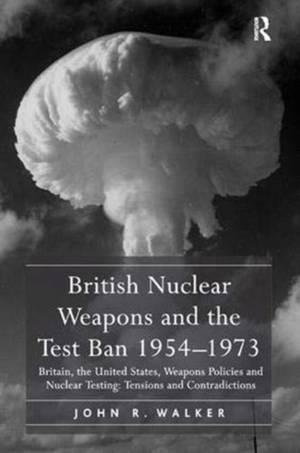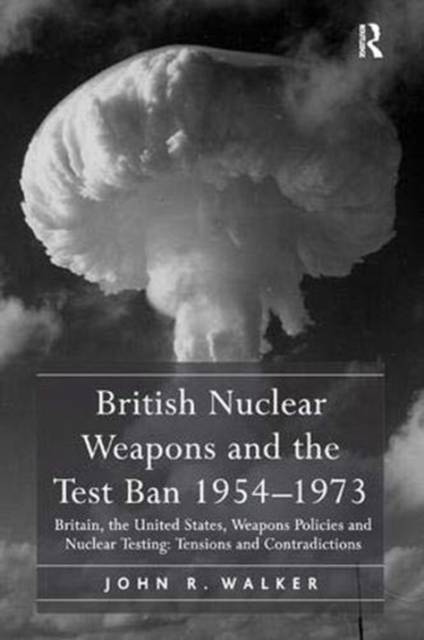
- Afhalen na 1 uur in een winkel met voorraad
- Gratis thuislevering in België vanaf € 30
- Ruim aanbod met 7 miljoen producten
- Afhalen na 1 uur in een winkel met voorraad
- Gratis thuislevering in België vanaf € 30
- Ruim aanbod met 7 miljoen producten
Zoeken
British Nuclear Weapons and the Test Ban 1954-1973
Britain, the United States, Weapons Policies and Nuclear Testing: Tensions and Contradictions
John R Walker
Paperback | Engels
€ 94,95
+ 189 punten
Uitvoering
Omschrijving
In 1962 Dean Acheson famously described Britain as having lost an Empire but not yet found a role. Perhaps nowhere is this more apparent than in the realms of nuclear weapons. An increasingly marginal world power, successive post-war British governments felt that an independent nuclear deterrent was essential if the country was to remain at the top table of world diplomacy. Focusing on a key twenty-year period, this study explores Britain's role in efforts to bring about a nuclear test ban treaty between 1954 and 1973. Taking a broadly chronological approach, it examines the nature of defence planning, the scientific goals that nuclear tests were designed to secure, Anglo-American relationships, the efficacy of British diplomacy and its contribution to arms control and disarmament. A key theme of the study is to show how the UK managed to balance the conflicting pressures created by its determination to remain a credible nuclear power whilst wanting to pursue disarmament objectives, and how these pressures shifted over the period in question. Based on a wealth of primary sources this book opens up the largely ignored subject of the impact of arms control on the UK nuclear weapons programme. Its appraisal of the relationship between the requirements and developments of the UK nuclear weapons programme against international and domestic pressures for a test ban treaty will be of interest to anyone studying post-war British defence and foreign policy, history of science, arms control, disarmament and non-proliferation and international relations. It also provides important background information on current events involving nuclear proliferation and disarmament.
Specificaties
Betrokkenen
- Auteur(s):
- Uitgeverij:
Inhoud
- Aantal bladzijden:
- 408
- Taal:
- Engels
Eigenschappen
- Productcode (EAN):
- 9781138383975
- Verschijningsdatum:
- 10/06/2019
- Uitvoering:
- Paperback
- Formaat:
- Trade paperback (VS)
- Afmetingen:
- 156 mm x 234 mm
- Gewicht:
- 566 g

Alleen bij Standaard Boekhandel
+ 189 punten op je klantenkaart van Standaard Boekhandel
Beoordelingen
We publiceren alleen reviews die voldoen aan de voorwaarden voor reviews. Bekijk onze voorwaarden voor reviews.











